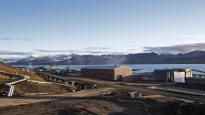Russian and Ukrainian miners have been working side by side in Barentsburg for decades. Now the gaps between the workers are freezing.
The war may be far away, but the tensions created by the crisis in Ukraine have strained the atmosphere even in a remote small town in the Norwegian Highlands.
In Barentsburg, Russian and Ukrainian coal miners have worked side by side for decades, but now both the weather and the atmosphere have been chilly over the spring winter.
In the town of the Svalbard archipelago you can see the remains of a bygone era, testifying to the long-standing presence of the late Soviet Union. The street scene is still adorned Vladimir Lenin a bust sculpture declaring in Cyrillic letters “Our Purpose – Communism.”
However, the common history of the Soviet Union no longer creates a bridge between Ukrainians and Russians in Barentsburg either.
Now the agglomeration is home to about 370 people, two-thirds of whom are Ukrainians. Most of the Ukrainians in the mining village have come from the Russian-speaking Donbass region. The rest of the inhabitants of Barentsburg are Russian.
Opinions are completely divided
At least so far, Barentsburg has been spared open bats. However, the differences in views in the village are sharp.
– Opinions are completely divided into two extremes, polarized, admits the Russian travel guide and historian Natalia Maksimishina.
At the same time, he still emphasizes how “the long and difficult history of the Soviet Union has taught us that people here know when to stop talking about politics.”
Some Ukrainians accuse the Russian state-owned company Arktikugol Trust, which operates a coal mine in Barentsburg, of quelling disagreements.
A sign that anger is boiling beneath the surface could be that about 45 people have left the city “since the start of the operation,” says the Russian consul. Sergei Gustshin. He speaks of an attack on Ukraine with a circular expression used by Russia.
Departures say a lot, as leaving Barentsburg is not easy. Sanctions imposed by Western countries on Russian banks have not only prevented Svalbard miners from sending money home to their families, they have also made it harder to buy plane tickets.
Gustshin admits that there are, of course, tensions and conversations in the social networks of Barentsburgers, such as Facebook and Telegram.
One hundred year contract
The Arktikugol Trust has been operating a mine in Barentsburg on the banks of the Isfjord fjord for almost a century, since 1932.
The layman may wonder how the Communist Soviet Union gained the right to enter Norwegian territory. The reason is the 1920 agreement on the status of the Svalbard. It recognized the archipelago as part of Norway, but at the same time guaranteed the citizens of the signatory countries equal access to the natural resources of the Svalbard.
Relying on that, the Soviet Union established a mine in the islands.
In addition to Lenin’s bust, the landmark of the Slavs’ presence in Barentsburg is Gustshin’s workplace, the Russian consulate. The building is protected by high iron bars and security cameras and is luxuriously decorated with a marble entrance, a winter garden and custom-made taps.
The splendor of the consulate stands out very clearly from the otherwise gray mining town.
